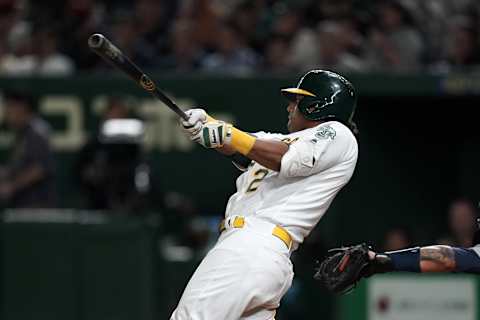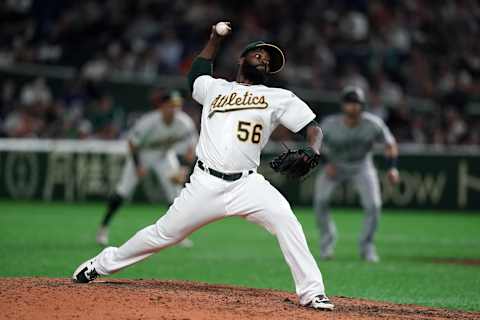Oakland Athletics: The Micro-Moments That Added up to a Defeat


The Oakland Athletics lost to the Seattle Mariners Thursday because they failed to execute small things at two critical moments of the game.
The Oakland Athletics lost a game they should have won Thursday in Tokyo. They lost due to execution errors. On such errors of execution can entire seasons turn.
As a result, instead of splitting their season-opening series with the Seattle Mariners, the A’s come back 0-2. The final score Thursday was 5-4 in 12 innings.
At 162 games, the baseball season is obviously an extended one. But it is comprised of a lengthy succession of micro-moments, two of which sabotaged the Athletics in Tokyo. No team executes perfectly in all such moments, but the polished teams perform precisely in the vast majority of them.
The Athletics bollixed both and lost as a result. As a 2018 wild card team and potential
post-season contender, such things are vital.

The first critical moment occurred in the bottom of the 11th inning. Oakland, playing as the home team, had rallied from an early 3-0 deficit on Khris Davis’ two-run seventh inning single to send the game into extra innings. In the 11th, they loaded the bases with two out against reliever Zac Rosscup thanks to two walks and a single.
That brought Davis to the plate again, this time with the winning run at third base.
In many circumstances, Davis would be the ideal candidate for such an at-bat. Not only had he delivered that critical single in the seventh, but he is generally recognized as Oakland’s best hitter. He hit 48 home runs and drove in 123 runs in 2018, and his .874 OPS led the playoff-bound Oakland Athletics.
But those numbers are all macros: they are true and legitimate broadly over the course of a season, but not necessarily pertinent in individual matchups.
At the micro-level, the level of the individual game-decisive matchup, Davis was a far less ideal candidate.
Begin with the fact that Davis was hitting in a clutch, late-game situation. With two outs and runners in scoring position last year, Davis batted just .231 with just five home runs. He struck out 28 percent of the time. In late innings of a close game, he was even worse, with a .220 average and a 32 percent strikeout rate.
Davis was facing Rosscup, a journeyman pitcher who relies on finesse. He batted .318 last season against power pitchers, but only .237 against those who relied on finesse. He did hit 21 of his 48 home runs against finesse pitchers…but the A’s didn’t need a grand slam; they needed a mere single.
Davis had already singled once…but he is not a singles hitter by nature. He has a long, power-focused swing that is not easily adapted to a contact-focused moment.
In fact, Davis played in 151 games last season, yet only delivered two singles in eight of them…roughly one per month. By contrast, he struck out twice or more eight times in September alone.
In that game-winning situation against Rosscup, Davis worked the count to 3-2…and then did what he did 175 times last season. He fanned.
Pinch-hitting for your power bat is a notion that is anathema to most strategists. In the big picture, it would make no strategical sense. But in the small, ultra-sensitive of-the-moment situations, it might make a lot of sense. Rather than Davis, what the A’s needed at that particular moment was a contact hitter.
But in today’s power-obsessed game, contact hitters are rare and the A’s bench was without one. It consisted of only four bodies, Robbie Grossman, Mark Canha, Franklin Barreto and Nick Hundley. None is an experienced pinch hitter and even if one were, all had been used by the ninth inning. In other words, A’s manager Bob Melvin was hamstrung by his own roster.
To a large degree, the Oakland Athletics were victims of the ongoing tendency to fatten up rosters with bullpen specialists. Oakland activated 10 of them for the two-game series and burned through seven of the 10 during Thursday’s game. But by the 11th inning, that still left them with three available relievers yet nobody capable of producing what they really needed…a scratch hit.
It is possible that next season’s roster expansion to 26 will ameliorate the bench inflexibility managers increasingly find themselves in, but probably more likely they’ll all max out to 13 pitchers, leaving them no better off.

Davis’ failure to adapt his game to deliver what was needed at the game’s key moment was one such failure. The second occurred one inning later and involved the kind of fielding execution issues teams presumably spend hours drilling on during training.
More from Call to the Pen
- Philadelphia Phillies, ready for a stretch run, bomb St. Louis Cardinals
- Philadelphia Phillies: The 4 players on the franchise’s Mount Rushmore
- Boston Red Sox fans should be upset over Mookie Betts’ comment
- Analyzing the Boston Red Sox trade for Dave Henderson and Spike Owen
- 2023 MLB postseason likely to have a strange look without Yankees, Red Sox, Cardinals
Dee Gordon opened the Mariners half of the inning with the kind of perfection Davis had failed to produce, a clean base hit. Oakland Athletics pitcher Ryan Buchter, probably distracted by the base stealing threat Gordon posed – he was, after all, carrying the lead run – walked Mitch Haniger, moving Gordon to second without the risk of a steal.
One out later, from the overly deep A’s bullpen, Fernando Rodney replaced Buchter to pitch to dangerous right-hander Edwin Encarnacion. But Rodney pitched too carefully and walked him to load the bases.
Rodney needed a double play ball and got one when Domingo Santana grounded to shortstop Marcus Semien. But Semien threw too cautiously to second baseman Jurickson Profar for the force, necessitating that Profar hurry his own throw to first for the inning-ending double play. He threw high, allowing Gordon to score the eventual winning run.
Had Semien and Profar handled their roles in converting the vital double play more efficiently, the A’s would have extended the game. Had Davis produced the 11th inning contact hit his team needed at that individual moment, the A’s would have won. None of those players, however, managed to adapt their own abilities to the situation at hand. As a result, the Athletics turned a victory into a defeat.
dark. Next. Seattle Mariners: Why Ichiro is the Real Hit King
It may only be March. But if Oakland fails to reach post-season play by the margin of one game, the Oakland Athletics can look back on these micro-execution failures to find the reason why. On a game-by-game basis, the difference between successful and unsuccessful teams is the ability to perform at the micro level.